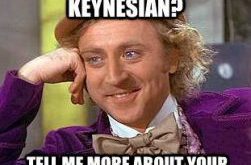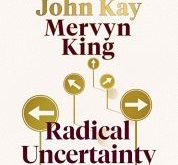Ekonomi – vetenskap eller gissningslek? Är nationalekonomi vetenskapligt baserad kunskap? Kan man förutspå hur enskilda individer eller hela samhällen kommer att agera ekonomiskt? Till exempel om miljonbonusar gör toppchefer mer lojala mot de företag som anställt dom? Kan ekonomiska analytiker verkligen se in i framtiden och förutspå kommande kriser? Eller handlar ekonomernas prognoser mer om en kvalificerad gissningslek? Yours truly, Tore Ellingsen, och...
Read More »Economics — where does it lead us?
Economics — where does it lead us? The issue of interpreting economic theory is, in my opinion, the most serious problem now facing economic theorists. The feeling among many of us can be summarized as follows. Economic theory should deal with the real world. It is not a branch of abstract mathematics even though it utilizes mathematical tools. Since it is about the real world, people expect the theory to prove useful in achieving practical goals. But...
Read More »Say ‘consistent’ one more time and I …
Say ‘consistent’ one more time and I … Being able to model a credible world, a world that somehow could be considered ‘similar’ to the real world is not the same as investigating the real world. The minimalist demand on models in terms of ‘credibility’ and ‘consistency’ has to give away to stronger epistemic demands. Claims in a ‘consistent’ model do not per se give a warrant for exporting the claims to real-world target systems. Questions of external...
Read More »The Habtic Standard
[unable to retrieve full-text content]The Habtic Standard: I wrote another article! This one is about why organizational change is hard and how it can be made less bad for workers…and it’s totally 100 percent not based off of personal experience I swear :)
Read More »Beyond mathematical modelling
Mathematical modelling has now dominated the economics academy for so long that younger people that emerge from economic studies who are dissatisfied with what they are taught, cannot think beyond the modelling. They have been immersed in it so long that it is a kind of common sense to them. The idea that modelling is bound to be almost always irrelevant just does not compute for many. Yet they recognize that modern academic economics mostly does not provide any...
Read More »‘New Keynesian’ macroeconomics
The standard NK [New Keynesian] model, like most of its predecessors in the RBC literature, represents an economy inhabited by an infinitely-lived representative household. That assumption, while obviously unrealistic, may be justified by the belief that, like so many other aspects of reality, the finiteness of life and the observed heterogeneity of individuals along many dimensions … can be safely ignored for the purposes of explaining aggregate fluctuations and their...
Read More »Why economic theory doesn’t help us to understand globalisation and trade
Why economic theory doesn’t help us to understand globalisation and trade .[embedded content]
Read More »MMT basics
We have already shown that deficit spending increases our collective savings. But what happens if Uncle Sam borrows when he runs a deficit? Is that wht eats up savings and forces interest rates higher? The answer is no. The financial crowding-out story asks us to imagine that there’s a fixed supply of savings from which anyone can attempt to borrow … MMT rejects the loanable funds story, which is rooted in the idea that borrowing is limited by access to scarce financial...
Read More »2021 Godley-Tobin Lecture: Marc Lavoie, “Godley versus Tobin on Monetary Matters”
REGISTER HERE.
Read More »Does it — really — take a model to beat a model? No!
Does it — really — take a model to beat a model? No! Many economists respond to criticism by saying that ‘all models are wrong’ … But the observation that ‘all models are wrong’ requires qualification by the second part of George Box’s famous aphorism — ‘but some are useful’ … The relevant criticism of models in macroeconomics and finance is not that they are ‘wrong’ but that they have not proved useful in macroeconomics and have proved misleading in...
Read More » Heterodox
Heterodox







